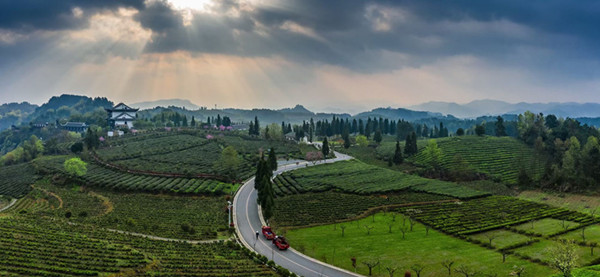Big data powers agricultural modernization in Kaiyang

The tea gardens of Yunshan Chahai in Kaiyang county [Photo/Guiyang news network]
Kaiyang county in Guiyang, the capital city of Southwest China's Guizhou province, has applied big data technology to develop its modern agriculture industry and build a number of smart agricultural industrial parks.
Taking Yunshan Chahai as a demonstration project, Kaiyang is developing its tea industry as a highlight in modern agricultural development and a new growth point for the agricultural economy.
Yunshan Chahai, located in Matou village of Hefeng township in Kaiyang, is a green eco-tourism scenic spot integrating tea tasting, leisure, entertainment and catering services. It has more than 5,000 mu (333.33 hectares) of selenium-rich green tea and visitors can experience tea-leaf picking and tea-leaf frying.
Through rentals and other methods, Yunshan Chahai has helped increase the incomes of more than 1,500 households in the surrounding areas.
In the past, tea cultivation has been stressful for owners of tea gardens, especially during the rainy season when tea trees' roots rot.
Fortunately in 2019, the tea gardens began to adopt smart agricultural and environmental monitoring facilities. Thanks to internet technologies, data on the soil, climate, humidity and rainfall can be collected, and with preparations before the rainy season, the occurrence of tea tree diseases has been reduced.
Applying remote cameras and visual monitoring tech, the growth situation of tea trees is clearly displayed on the large screen in the monitoring room. The application of big data has also enabled professional agricultural technology guidance from experts via video links.
This year, the tea output of Yunshan Chahai has reached 10,000 kilograms, and the total annual output is estimated to hit 70 metric tons, according to the owner.
Presented by China Daily.
黔ICP备05001922号-3
